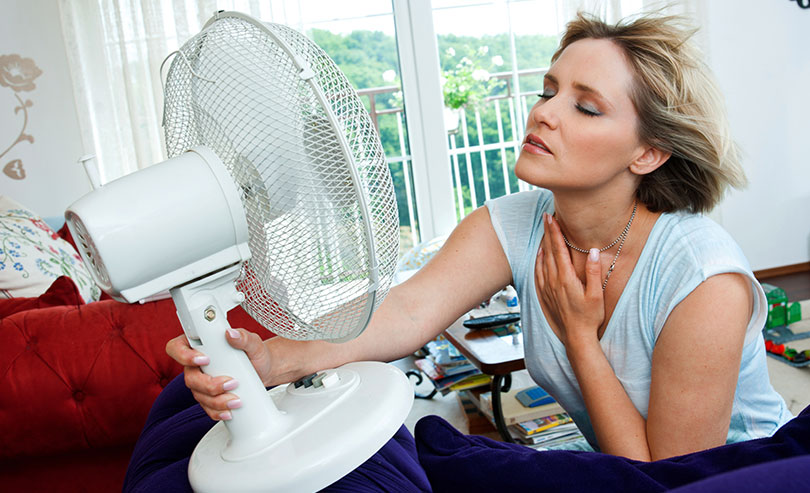Understanding Premature Menopause
We have an expectation that menopause is something that occurs to women later in life. Unfortunately, expectations can set us up for disappointment.
While menopause is a phase in life that every woman will reach eventually, it can happen much earlier than you anticipate.
What Is Premature Menopause?
Menopause starts when your ovaries stop producing hormones and releasing eggs, your periods stop, and for a majority of women, it happens sometime in their 50s.
This condition is not limited to a certain age and when it happens before age 40, it’s called premature menopause (not to be confused with early menopause, which happens before age 45).
Premature menopause is relatively rare; it only affects a small percentage of the population but can occur in young women who are in their teens and 20s.
What Are the Symptoms of Premature Menopause?
Diagnosis of premature menopause is a bit complicated since menopause isn’t on the radar of younger women, which means symptoms may be attributed to other conditions.
Your Menstrual Cycle
Your menstrual cycle is one of the first signs you’ll notice as the inconsistency reflects the hormone changes in your body. You may experience irregular periods when they arrive more frequently or arrive later than usual.
Blood flow during your cycles can also vary month-to-month where some months are heavy flow, and others are light (or there is no period at all). The duration, flow, and frequency of your period may change, and you’ll never know what to expect each month.
Keep track of your cycle when you notice irregularity so you can communicate the erratic nature of your cycle to your doctor. If you have not had your period for 12 months in a row, you have gone through menopause.
Other Signs of Premature Menopause
Other common signs of premature menopause are decreased libido, decreased sex drive, bladder issues, and insomnia.
Additional symptoms are hot flashes, dry skin, eyes, or mouth, and vaginal dryness.
What Causes Premature Menopause?
Premature menopause can happen because of health conditions, some surgeries or medicines, and it can even happen without any reason at all. Have your doctor give you a complete evaluation to try and diagnose the cause of your menopause.
The evaluation is important as your premature menopause could have a condition that requires additional treatment. While determining a specific cause can be difficult, there are a few reasons that premature menopause occurs.
If you've undergone a hysterectomy before your menopausal years, you may be wondering about the side effects of hysterectomy before menopause are.
- A family history of premature menopause may be a factor.
- Smokers may reach menopause a couple of years earlier, and menopause symptoms may be amplified.
- Infections from certain diseases, like tuberculosis, can affect how the ovaries function and induce premature menopause.
- Cancer treatments, such as chemotherapy or radiation, can cause damage to your ovaries.
- Surgical removal of the ovaries (oophorectomy) or uterus (hysterectomy) can bring on premature menopause.
- Women born having issues with their chromosomes, or missing chromosomes may experience premature menopause. For example, Turner’s syndrome is a condition where women are born without (or with only part of) one X chromosome, which affects how the ovaries are formed and how the menstrual cycle functions.
- HIV and AIDS can contribute to early menopause if the medication for their infection is not well-controlled.
- While infrequent, autoimmune diseases, like thyroid disease or rheumatoid arthritis) can promote premature menopause. The body may attack the ovaries and inhibit hormone production.
- Stress can make the severity of menopause symptoms worse.
- Sometimes there is no discernable reason, and premature menopause is just a crapshoot.
The Complications of Premature Menopause
Women who experience premature menopause cannot get pregnant which may enhance feelings of depression or sadness. If a woman is pregnant when she enters premature menopause, there is also the possibility of miscarriage.
Due to the impact in estrogen levels, women with premature menopause can also experience a higher risk of health problems like heart disease and osteoporosis or diminished bone health, and even risk of stroke. Menopause symptoms may also be more severe than menopause that starts later in life.
How Is Premature Menopause Diagnosed?
When signs of early menopause present, be sure to schedule an appointment with your physician.
There are some common tests that help identify the issue. These tests include pregnancy tests, thyroid disease tests, estradiol level tests, and follicle stimulating hormone tests.
Once the diagnosis is confirmed, there are a few treatments that can help relieve symptoms which include lifestyle changes, alternative medicine, and physician-prescribed medication.
Lifestyle Changes
There are some small things you can do for yourself to ease your own symptoms:
- Focus on your health and switch to a balanced diet, get enough sleep, and stick to an exercise schedule.
- Find ways to manage your stress levels; a few suggestions are yoga, meditation, and aromatherapy.
- Take care of your emotional health and reach out to your family and friends for support – it’s always helpful having somebody to talk to. As the risk for osteoporosis increases with menopause, up your calcium intake to promote bone health.
- Ditch your vices like smoking and alcohol as these habits tend to trigger symptoms.
Alternative Medicine
Herbal remedies can help balance hormone levels. Phytoestrogenic herbs contain phytoestrogen which is similar to human estrogen. Some women opt to use these to balance their estrogen levels when menopause causes their natural levels to decline.
These herbs are not recommended as a long-term solution since the body starts to depend on this outside source for estrogen which affects natural estrogen production. Hormone-regulating herbs do not have any estrogen, and instead, stimulate the endocrine glands to produce hormones.
Medications
Prescription drugs offer quick treatment of symptoms, however, these come with some risk.
Hormone replacement therapy, though a popular option, increases the risk for stroke and heart disease. Synthetic estrogen is generally prescribed for women who have had their uterus removed.
The Takeaway
They say with life, and you have to expect the unexpected. While premature menopause is not a condition that you anticipate, it helps to know that it is a possibility. With several ways to manage your symptoms, premature menopause doesn’t have to get in the way of living the life you want.







